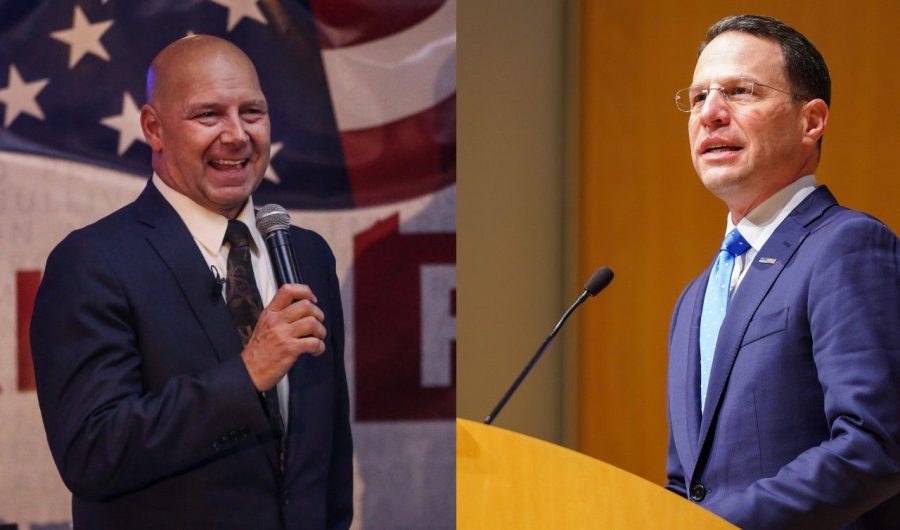A Tale of Two Pennsylvanias: PA Gubernatorial Race
Courtesy of Thomas Hengee & Steven M. Falk / Philadelphia Inquirer
Mastriano (left) and Shapiro (right) will face off in the PA gubernatorial race on November 8.
November 8, 2022
While the country will bear the effects of the midterm elections, the outcome of the Pennsylvania governor race has implications that will directly affect Pennsylvanians.
There are two very different paths Pennsylvania can go down depending on the outcome of the election due to the contrasting policy positions of the two candidates. Josh Shapiro, the current PA attorney general, is the Democratic candidate for Pennsylvania governor. Doug Mastriano, a current member of the PA State Senate, is the Republican candidate for governor of Pennsylvania. Because of the polarization of political parties, these two candidates lie very far away from each other on the political spectrum.
In contemporary issues, such as those surrounding the LGBTQ+ community, the two candidates have very different policy positions. Mastriano voted for a bill while in the PA State Senate banning trans women and girls from competing with teams that correspond with their gender. Shapiro, on the other hand, does not support this type of legislation and would prefer to leave the decision up to the state’s interscholastic school sports’ association, which is currently the protocol. These two opposing views on transgender rights and protections would manifest in two very different versions of legislation depending on the candidate who is elected to the governorship.
Mastriano and Shapiro also have opposing views on public education. Mastriano has advocated for school choice, in which parents can choose where to send their children regardless of where they live. He has proposed eliminating property taxes to fund public schools without offering a replacement for that funding. Instead, he proposed giving the state’s average spending of about $19,000 per student to parents and allowing them to choose to send their children to private schools or schools outside of their school district. Mastriano’s campaign website details his reasoning behind his position.
“By redirecting our state funds to follow students instead of systems, not only will we expand choice on where parents can send their children to school, but we will also save money,” Mastriano’s website states. “Establishing programs like Education Opportunity Accounts (EOAs) would provide families with direct access to educational resources. With better accountability and increased competition for students amongst schools, Pennsylvania can actually save money on expenditures for education while improving its quality.”
On the other hand, Shapiro has said he would raise funding for K-12 public education. He would also route money through the state’s “fair funding formula,” which takes into account poverty levels and local needs. Because public schools are funded by property taxes in Pennsylvania, where a students’ parents live can dictate the type of education they are going to receive. The fair funding formula would take this into account and try to equally distribute school funding across all PA public school districts.
“It starts by making sure every single one of them, regardless of their socioeconomic status, regardless of the zip code they’re from, regardless of their skin color, get an opportunity to succeed,” Shapiro said.
In relation to voting laws and election rules, Mastriano’s website says he supports “universal voter ID,” which many Democrats call out as voter suppression laws. Mastriano also supports outlawing no-excuse mail-in voting. Shapiro has proposed expanding voter registration by automatically registering eligible voters at 18 and extending deadlines for registration and ballot requests. He also supports expanding voting resources and ballots into multiple languages.
Current Pennsylvania law allows abortion through the first 23 weeks of pregnancy. During his time in PA State Senate, Mastriano has pushed for bills that ban abortion after six weeks, and he does not believe in exceptions in cases of rape or incest. He believes women who violate his proposed six-week bill should be charged for murder. Mastriano was interviewed by a PA radio station in 2019 on the topic of abortion.
“Ok, let’s go back to the basic question there,” Mastriano said. “Is that a human being? Is that a little boy or girl? If it is, it deserves equal protection under the law.”
Shapiro supports abortion rights and has promised to veto any legislation that would further restrict abortion access. After the Dobbs decision overturning Roe v. Wade was released, Shapiro released a statement.
“I will fight any attempt to erode women’s rights in our Commonwealth,” Shapiro said.
The potential outcome of Pennsylvania’s gubernatorial race has major implications for all Pennsylvanians. Women, LGTBQ+ community members, lower income people and other marginalized groups stand to see the largest difference in the two different realities depending on who wins the Pennsylvania governorship.
This article was inspired by Spotlight PA’s “One Vote, Two Pennsylvania’s” series.












